The Golden Dawn or Thoth Method
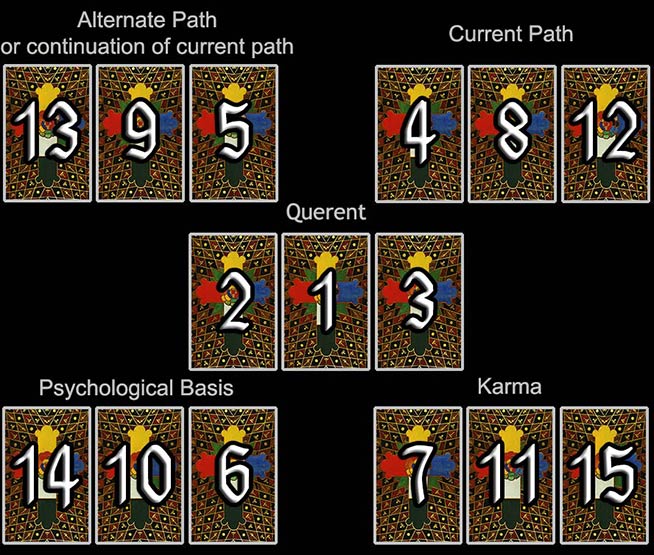
Difficulty: Complicated
Note: Decks that use reversed cards such as the Rider-Waite do not work well with this spread, which was designed to be read using elemental dignities.
The Golden Dawn spread is best suited for use with the bifrost Tarot and especially the Book of Thoth, as these decks are meant to be read a certain way with the Court cards. Princes and Queens represent actual men and women connected with the matter, while Princesses generally represent ideas; thoughts or opinions, and Knights represent arrival or departure of a matter depending on the direction faced.
In this spread, particular attention should be payed to a card’s exact position in relation to its neighbors. Whether the neighbor cards bear the same energy (suit) determines whether a card is considered well- or ill-dignified. Opposite suits ill-dignify each other, while other suits are considered friendly. Cards of the same suit strengthen each other.
As with other spreads, it is important to count the cards’ tendencies, such as whether there is a lot of one particular suit or number pattern. The patterns will reveal special messages. Lots of Majors indicates higher forces at work, lots of cups suggest strong emotions, etc.
Card #1 represents the querent and the nature of the topic at hand.
Cards #2 & #3 are used in conjunction with #1 to further comprehend the nature of the topic.
Your Golden Dawn Reading with the Thoth Tarot
| The Alternate Path (or Extension of Current Path) |
Your Current Path |
|||||
The Chariot |
Ace of Swords |
Art |
Prince of Cups |
2 of Cups |
Knight of Cups |
|
| The Querent | ||||||
Ace of Wands |
6 of Disks |
Prince of Swords |
||||
| The Psychological Basis | Karma | |||||
Fortune |
7 of Disks |
The Priestess |
Princess of Cups |
8 of Disks |
8 of Cups |
|
This spread is set up to read a certain way with the Court cards. Princes and Queens represent actual men and women connected with the matter, while Princesses generally represent ideas; thoughts or opinions, and Knights represent arrival or departure of a matter depending on the direction faced.
In this spread particular attention should be payed to a card's exact position in relation to its neighbors. Whether the neighbor cards bear the same energy (suit) determines whether a card is considered well- or ill-dignified. Opposite suits ill-dignify each other, while other suits are considered friendly. Cards of the same suit strengthen each other.
Also it is important to count the cards' tendencies, such as whether there is a lot of one particular suit or number pattern. Patterns reveal special messages. Lots of trumps means higher forces at work, lots of cups means strong emotions, etc.
The Querent
cards represent the querent and the nature of the topic at hand. The first card (in the center of the spread) represents the very core of the matter, and the other two cards around it are added to it in order to further comprehend the nature of the topic.

Moon in Taurus – Success
The Number Six, Tiphareth, as before, represents the full harmonious establishment of the Energy of the Element. The Moon in Taurus rules the card; and this, while increasing the approach to perfection (for the Moon is exalted in Taurus and therefore in her highest form) marks that the condition is transient.
The disks are arranged in the form of the Hexagram, which is shown in skeleton. In the centre blushes and glows the light rose- madder of dawn, and without are three concentric circles, golden yellow, salmon-pink, and amber. These colours show Tiphareth fully realised on Earth; it reaffirms in form what was mathematically set forth in describing the Ace. The planets are arranged in accordance with their usual attribution; but they are only shown as disks irradiated by the Sun in their centre. This Sun is idolised as the Rose and Cross; the Rose has forty-nine petals, the interplay of the Seven with the Seven.
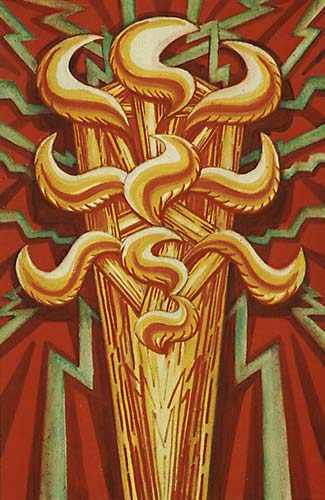
The Root of Fire
This card represents the essence of the element of Fire in its inception. It is a solar-phallic outburst of flame from which spring lightnings in every direction. These flames are Yods, arranged in the form of the Tree of Life.
It is the primordial Energy of the Divine manifesting in Matter, at so early a stage that it is not yet definitely formulated as Will.

Aquarius
This card represents the airy part of Air. This chariot is drawn by winged children, looking and leaping irresponsibly in any direction that takes their fancy; they are not reined, but perfectly Capricious. The chariot consequently is easy enough to move, but quite unable to progress in any definite direction except by accident. This is a perfect picture of the Mind.
The operation of his logical mental processes has reduced the Air, which is his element, to many diverse geometrical patterns, but in these there is no real plan; they are demonstrations of the powers of the Mind without definite purpose. In his right hand is a lifted sword wherewith to create, but in his left hand a sickle, so that what he creates he instantly destroys. A person thus symbolised is purely intellectual. He is full of ideas and designs which tumble over each other. He is a mass of fine ideals unrelated to practical effort. He has all the apparatus of Thought in the highest degree, intensely clever, admirably rational, but unstable of purpose, and in reality indifferent even to his own ideas, as knowing that any one of them is just as good as any other. He reduces everything to unreality by removing its substance and transmuting it to an ideal world of ratiocination which is purely formal and out of relation to any facts, even those upon which it is based.
Your Current Path
cards represent your current path as it would unfold naturally. These cards are read in chronological order from left to right.
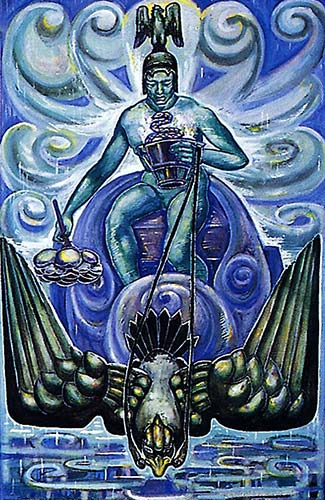
Scorpio
The Prince of Cups represents the airy part of Water. On the one hand, elasticity, volatility, hydrostatic equilibrium; on the other hand, the catalytic faculty and the energy of steam. He is a warrior partly clad in armour, which seems, however, rather a growth than a covering. His helmet is surmounted by an eagle, and his chariot, which resembles a shell, is also drawn by an eagle. His wings are tenuous, almost of gas. This is a reference to his power of volatilisation understood in the spiritual sense. The whole symbolism of this card is exceedingly complicated, for Scorpio is the most mysterious of the Signs, and the manifested portion of it symbolised by the eagle is in reality the least important part of his nature.
The moral characteristics of the person pictured in this card are subtlety, secret violence, and craft. He is intensely secret, an artist in all his ways. On the surface he appears calm and imperturbable, but this is a mask of the most intense passion. He is on the surface susceptible to external influences, but he accepts them only to transmute them to the advantage of his secret designs. He is thus completely without conscience in the ordinary sense of the word, and is therefore usually distrusted by his neighbours. They feel they do not, and can never, understand him. Thus, he inspires unreasonable fear. He is in fact perfectly ruthless. He cares intensely for power, wisdom, and his own aims.
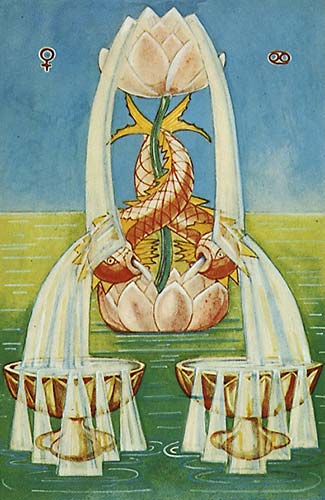
Venus in Cancer – Love
The Two always represents the Word and the Will. It is the first manifestation. Therefore, in the suit of Water, it must refer to Love, which recovers unity from dividuality by mutual annihilation. The card also refers to Venus in Cancer. Cancer is, more than any other, the receptive Sign; it is the House of the Moon, and in that Sign Jupiter is exalted. These are, superficially, the three most friendly of the planets.
The hieroglyph of the card represents two cups in the foreground, overflowing upon a calm sea. They are fed with lucent water from a lotus floating upon the sea, from which rises another lotus around whose stem are entwined twin dolphins.
The number Two referring to Will, this card might really be renamed the Lord of Love under Will, for that is its full and true meaning. It shows the harmony of the male and the female: interpreted in the largest sense. It is perfect and placid harmony, radiating an intensity of joy and ecstasy.
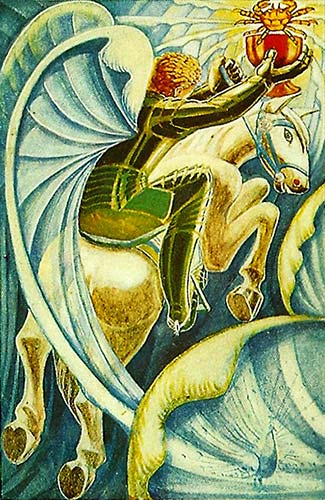
Pisces
The Knight of Cups represents the fiery part of Water, the swift passionate attack of rain and springs; more intimately, Water's power of solution. He is clothed in black armour furnished with bright wings which, together with the leaping attitude of his white charger, indicates that he represents the most active aspect of Water. In his right hand he bears a cup from which issues a crab, the cardinal sign of Water, for aggressiveness. His totem is the peacock, for one of the stigmata of water in its most active form is brilliance. There is here also some reference to the phenomena of fluorescence.
The characteristics of the person signified by this card are nevertheless mostly passive, in accordance with the Zodiacal attribution. He is graceful, dilettante, with the qualities of Venus, or a weak Jupiter. He is amiable in a passive way. He is quick to respond to attraction, and easily becomes enthusiastic under such stimulus; but he is not very enduring. He is exceedingly sensitive to external in fluence, but with no material depth in his character.
The Alternate Path
cards represent the alternate path that you could choose to take in lieu of the Current Path. However, if the cards that come up seem to indicate that they go along with the Current Path, these three cards should be interpretted not as an Alternate Path, but as a chronological extension of the Current Path (also read from left to right).
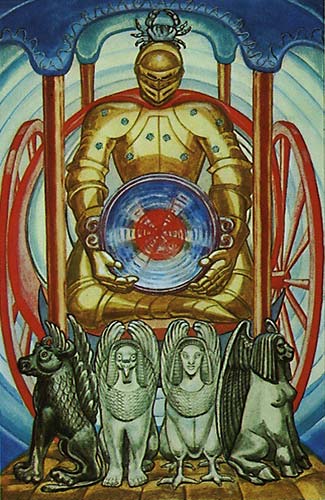
Cancer
Triumph, victory, hope, memory, digestion, violence in maintaining traditional ideas, the 'die-hard', ruthlessness, lust of destruction, obedience, faithfulness, authority under authority.
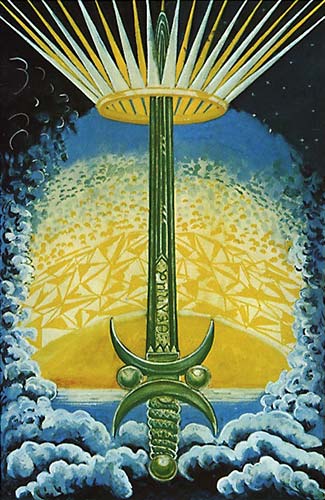
The Root of Air
The Ace of Swords is the primordial Energy of Air, the Essence of the Vau of Tetragrammaton, the integration of the Ruach. Air is the result of the conjunction of Fire and Water; thus, it lacks the purity of its superiors in the male hierarchy, Fire, Sol and the Phallus. But for this same reason it is the first card directly to be apprehended by the normal consciousness of Mankind.
In nature, the obvious symbol of Air is the Wind 'which bloweth whithersoever it listeth'. It lacks the concentrated Will of Fire to unite with Water: it has no corresponding passion for its Twin Element, Earth. There is indeed, a notable passivity in its nature; evidently, it has no self-generated impulse. But, set in motion by its Father and Mother, its power is manifestly terrific. It visibly attacks its objective, as they, being of subtler and more tenuous character, can never do. Its 'all-embracing, all-wandering, all-penetrating, all-consuming' qualities have been described by many admirable writers, and its analogies are for the most part patent to quite ordinary observers.
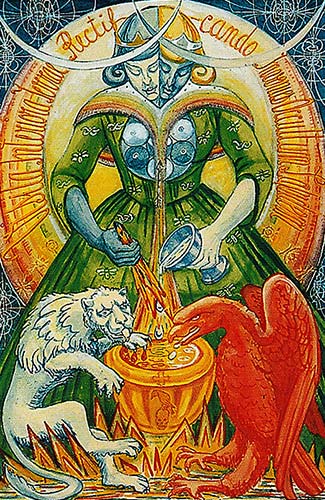
Sagittarius
Combination of forces, realisation, action based on accurate calculation; the way of escape, success after elaborate manoeuvres.
The Psychological Basis
cards shed light upon the psychological undertones of the current problem.
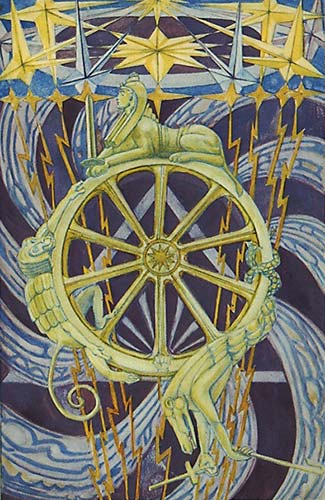
Jupiter
Change of fortune. (This generally means good fortune because the fact of consultation implies anxiety or discontent.)
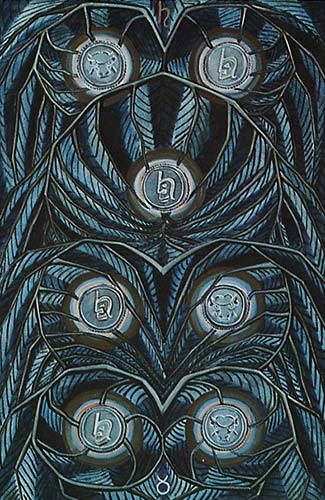
Saturn in Taurus – Failure
The number Seven, Netzach, has its customary enfeebling effect, and this is made worse by the influence of Saturn in Taurus. The disks are arranged in the shape of the geomantic figure Rubeus, the ugliest and most menacing of the Sixteen. The atmosphere of the card is that of Blight. On the background, which represents vegetation and cultivation, everything is spoiled. The four colours of Netzach appear, but they are blotched with angry indigo and reddish orange. The disks themselves are the leaden disks of Saturn. They suggest bad money.
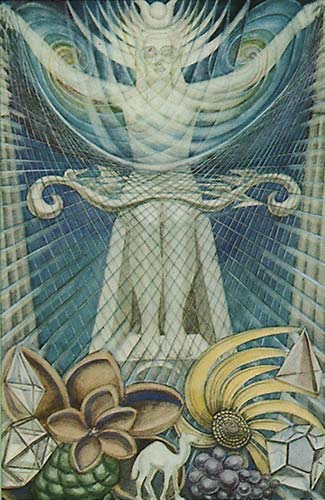
The Moon
Pure, exalted and gracious influence enters the matter. Hence, change, alternation, increase and decrease, fluctuation. There is, however, a liability to be led away by enthusiasm; one may become 'moon-struck' unless careful balance is maintained.
Karma
These cards represent the influences of karma and destiny that are beyond your control. They suggest adapting to this fate.

The Princess of Cups represents the earthy part of Water; in particular, the faculty of crystallisation. She represents the power of Water to give substance to idea, to support life, and to form the basis of chemical combination. She is represented as a dancing figure, robed in a flowing garment on whose edges crystals are seen to form.
For her crest she wears a swan with open wings. The symbolism of this swan reminds one of the swan in oriental philosophy which is the word AUM or AUMGN, which is the symbol of the entire process of creation. She bears a covered cup from which issues a tortoise. This is again the tortoise which in Hindu philosophy supports the elephant on whose back is the Universe. She is dancing upon a foaming sea in which disports himself a dolphin, the royal fish, which symbolises the power of Creation. The character of the Princess is infinitely gracious. All sweetness, all voluptuousness, gentleness, kindness and tenderness are in her character. She lives in the world of Romance, in the perpetual dream of rapture. On a superficial examination she might be thought selfish and indolent, but this is a quite false impression; silently and effortlessly she goes about her work.
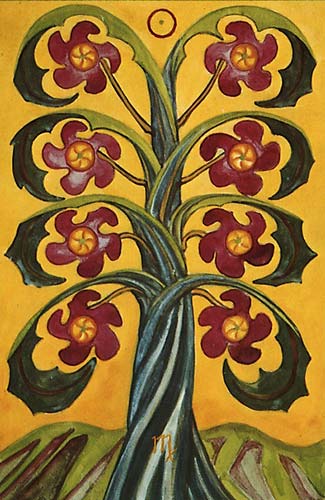
Sun in Virgo – Prudence
The number Eight, Hod, is very helpful in this card, because it represents Mercury in his most spiritual aspect, and he both rules and is exalted in the sign of Virgo, which belongs to the Decan, and is governed by the Sun. It signifies intelligence lovingly applied to material matters, especially those of the agriculturalist, the artificer and the engineer.
One might suggest that this card marks the turn of the tide. The seven of Disks is in one sense the fullest possible establishment of Matter – compare Atu XV – the lowest fallen and therefore the highest exalted. These last three cards seem to prepare the explosion which will renew the whole Cycle. Note that Virgo is Yod, the secret seed of Life, and also the Virgin Earth awaiting the Phallic Plough.
The interest of this card is the interest of the common people. The rulership of the Sun in Virgo suggests also birth. The disks are arranged in the form of the geomantic figure Populus. These disks may be represented as the flowers or fruits of a great tree, its solid roots in fertile land.
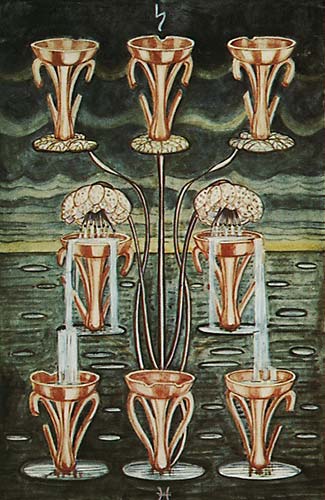
Saturn in Pisces – Indolence
Lotuses droop for lack of sun and rain, and the soil is poison to them; only two of the stems show blossoms at all. The cups are shallow, old and broken. They are arranged in three rows; of these the upper row of three is quite empty. Water trickles from the two flowers into the two central cups, and they drip into the two lowest without filling them. The background of the card shows pools, or lagoons, in very extensive country, incapable of cultivation; only disease and miasma tic poison can flourish in those vast Bad Lands. The water is dark and muddy. On the horizon is a pallid, yellowish light, weighed down by leaden clouds of indigo.